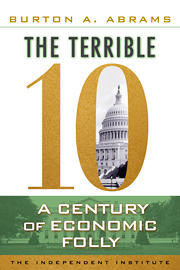Tuesday marks the anniversary of one of the most destructive pieces of legislation in U.S. history: the Hawley-Smoot Tariff Act of 1930, which triggered a disastrous trade war, intensified the Great Depression and helped set the stage for World War II.
Unfortunately, as the Affordable Care Act and Dodd-Frank Wall Street Reform and Consumer Protection Act demonstrate, Washington continues its long-held tradition of passing ill-conceived legislation.
The Affordable Care Act and Dodd-Frank, both passed in 2010, clearly have hurt the U.S. economy: increasing business costs, slowing hiring, adding to the uncertainty that investors face. But Hawley-Smoot arguably was worse.
The U.S. economy already was well into recession in 1930, with unemployment rising and national output plunging. Concerned with an impending election, Congress sensed the need to placate nervous voters. Its solution was the Hawley-Smoot Act, the brainchild of Rep. Willis C. Hawley, R-Ore., and Sen. Reed Smoot, R-Utah.
The act was the first shot in a trade war and raised the tax on imported goods to their highest levels in more than 100 years. Henry Ford called it “economic stupidity,” and he was neither alone nor mistaken.
More than a thousand U.S. economists, an incredibly large number for its day, urged rejection of Hawley-Smoot and a veto from President Hoover should it pass. The economists said high tariffs would damage international relations and trigger a trade war.
The Republican-controlled Congress ignored the economists’ warning and passed the legislation anyway, which squeaked through the Senate by two votes. The U.S. proceeded to jack up the tariffs on more than a thousand imported products.
The average tariff on protected goods was 53%, but the rates varied. In today’s terms, the tax on a $20,000 imported automobile would be $10,600. The rate on woolen goods was 59.83%, earthenware and glassware 53.64%, agricultural products 34%, and dolls, just in time for Christmas, a full 90%.
As critics had predicted, other nations retaliated, imposing or increasing tariffs on U.S.-made goods. And the results were soon evident.
In the three years following passage of the act, the U.S. trade surplus was cut in half, opposite the result intended by Hawley-Smoot’s supporters. This helped push the economy deeper into recession, as factory output slowed and more and more workers lost their jobs.
Hawley and Smoot both went down to defeat in their 1932 re-election bids, and the destructive act that bore their names surely played a role.
President Franklin D. Roosevelt helped to roll back the tariffs in 1934 with the Reciprocal Trade Agreements Act, but trade restrictions remained high and were not seriously reduced until after World War II.
Hawley-Smoot damaged its promoters and intended beneficiaries alike and imposed tremendous costs on consumers. The Hawley-Smoot Act clearly ranks as one of the worst economic policies in American history.
For all but the willfully blind, the lessons should remain apparent. Politicians who push misguided policies are likely to find voters willing to give them the boot. Sadly, the negative consequences of those misguided policies can easily outlast the election cycle.
The Affordable Care Act and Dodd-Frank are still works in progress. As their negative consequences unfold, we will obtain a clearer picture of how they rank among the worst policies in U.S. history.








